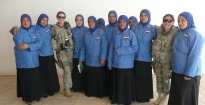Contractor Harassed Iraqi Interpreters
The Iraqi women all took nicknames — Linda, Susan, Kathy, Mary, Angel — to make it easier for the American soldiers to remember them. They had college educations and spoke English well enough to work as interpreters with U.S. combat units, jobs that came with a high mortality rate even off the battlefield: insurgents targeted them for assassination as collaborators.
Because of the lingering dangers for Iraqis who had allied themselves with the Americans, the State Department created a special visa to allow interpreters and other workers into the United States. For most of the women, the Special Immigrant Visa became a lifeline.
But applying for the visa meant winning the approval of Christopher J. Kirchmeier, a contractor in charge of security badges and clearances on a base inside Baghdad’s Green Zone. An Army counterintelligence specialist, fluent in Arabic, Kirchmeier had taken leave from his California National Guard unit in 2009 to work for Government Services, a Chantilly-based subsidiary of L-3 Communications.
Kirchmeier, then 26, sexually harassed at least two of the women he was charged with vetting, according to several former co-workers and the women. His alleged conduct was a violation of L-3’s ethics code, which says “physical conduct of a sexual nature is inappropriate in the work place and may be unlawful.” He also punished those who rebuffed his advances or who complained about his behavior by seizing their security badges and sabotaging their visa applications, according to the former co-workers and interpreters who recounted their experiences in a series of interviews.
Kirchmeier, reached by telephone late last year, responded only obliquely to a reporter’s account of the allegations being made against him, calling them “strange.”
“I guess I really made an impression on people,” he added. Declining to speak further without the permission of “people way above me,” he hung up and has not responded to subsequent attempts to reach him. L-3 and its GSI subsidiary also did not respond to phone and e-mail inquiries about his employment.
Kirchmeier’s superiors at L-3 and in the military knew of his behavior for several months but did nothing about it, according to the interpreters and an Army officer who supports their claims of harassment. In early December 2009, Maj. David Underwood, then recuperating in Texas from combat wounds suffered in Iraq, e-mailed the top U.S. commander in Iraq, Gen. Raymond Odierno, complaining that Kirchmeier “has been involved in the sexual harassment/intimidation of local national interpreters.”
“Five days later,” Underwood said in a recent interview, “Chris was gone.”
There the matter might have ended, except for a campaign by advocates for the women, who have sought to have the government punish Kirchmeier and his superiors at L-3 and in the Army, and tried to persuade the State Department to reverse its decision barring one of the women from the United States.
The women have not filed formal charges, and any attempt to prosecute a defense contractor under military law probably would be challenged.
Click here to read more.


